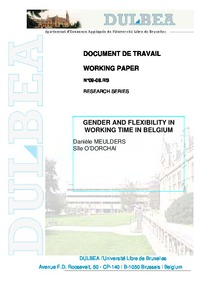Gender and flexibility in working time in Belgium
"Since the 90s European discourse tends to present flexibility as the magic tool to raise employment, even if in a context of crisis, more flexible workers will be dismissed faster. The purpose of this paper is to assess the evolution of working time arrangements in Belgium as of 1992 from a ge...
| Main Authors: | , |
|---|---|
| Institution: | ETUI-European Trade Union Institute |
| Format: | TEXT |
| Language: | English |
| Published: |
Brussels
2009
ULB |
| Subjects: | |
| Online Access: | https://www.labourline.org/KENTIKA-19188295124919064779-Gender-and-flexibility-in-work.htm |
| Summary: | "Since the 90s European discourse tends to present flexibility as the magic tool to raise employment, even if in a context of crisis, more flexible workers will be dismissed faster. The purpose of this paper is to assess the evolution of working time arrangements in Belgium as of 1992 from a gender perspective. It appears that new innovative forms of flexibility have not spread widely in Belgium but that the basic form of time flexibility, i.e. part time work, has developed (and continues to develop) rapidly amongst women workers. Part-time work is however one of the main causes of existing gender gaps on Belgium’s labour market." |
|---|---|
| Physical Description: | 27 p. Digital |

